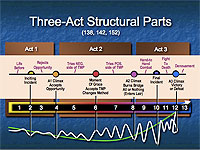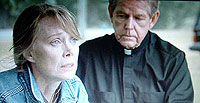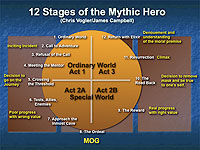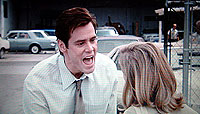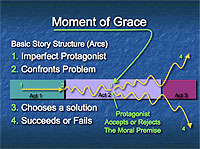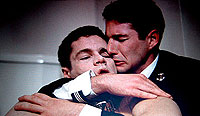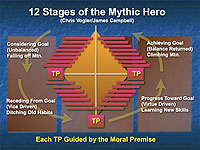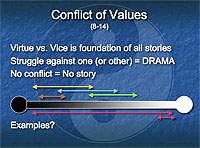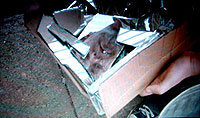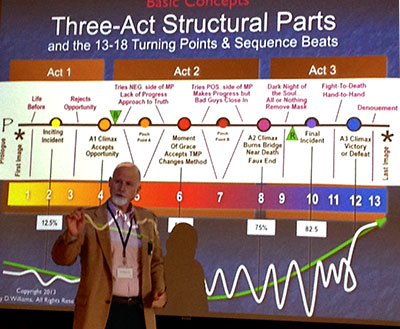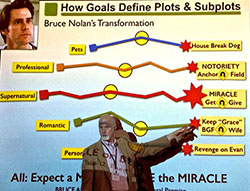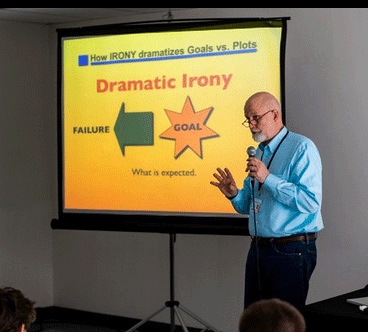
|
| (Email me for regular mailing address) • Email: Stan@MoralPremise.com Follow @MoralPremise | ||
|
 |
|
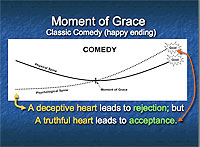
|
Seminar & Workshop
Workshop Slide Sets
I have been known to post here slide sets (as PDF documents) from recent workshops. But since covid-19 hit, everything has been done via zoom and theStorycraft OnLine Training sequence, accessible above.
If you are an instructor who would like editable copies of my slide sets (all are in Apple's Keynote) contact me. I make my slide sets available for free as long as you give me credit and promote my work. It helps if you're familiar with my live or on-line workshops to narrow down which slide sets you would like to use. There are too many to list.
Send request for seminar or workshop to:
Workshop Content
DISCLAIMER: Depending on the workshop length and logistic concerns the form and content of the workshop may change without notice. All workshops include a detailed description of the Secrets of all successful stories, with emphasis on motion picture narratives. This is done, conveniently, with a comprehensive presentation of the moral premise concept with practical suggestions for its implementation. The "Ah-Ha!" moment comes when you see the simple, lock-step connection between a single moral premise statement, and EVERYTHING dealing with the movie's creation -- from story structure, to art direction, to marketing. There will be time to ask questions both in the class and during breaks or afterwards. Depending on the length of time available we may (or may not) have time to delve in the stories that participants are working on.
OVERVIEW Depending on the length of the presetantion, you will learn the most fundamental elements of all successful story structure, whether they are in the form of a movie, a stage play, or a novel. The moral premise is not a new idea. It has been an integral part of all story-telling from ancient times. Yet, it may be the most important of all.
WHO SHOULD ATTEND?
Narrative writers, producers, and directors of all story genres and media will find this session beneficial, if not foundational. Fans of motion pictures may also want to attend. If you're a writer this session will give you a practical understanding of the moral premise that will speed along and improve the quality of your story's structure. In many ways the moral premise is a powerful muse; when used correctly it will inspire and focus your efforts, and powerfully connect you with your audience. Say "Good-bye" to writer's block. As a fan you'll have a greater appreciation of movies, plays, and novels when you understand and see how writers and directors use the moral premise as the center and motive force of their tales.
WHAT TO EXPECT?
The seminar lectures will be illustrated by both computer graphics and motion clips from popular films. Dr. Williams will, for the most part, follow the structure of the book. The presentation is continually being updated with new insights thanks to the generous contribution of past session participants, bloggers, story consulting sessions, and, of course, new films. The outline below, therefore, may be slightly different from one presentation to the next. Shorter presentations have no exercises. All day workshops include times to test out the principles with exercises and Q&A periods.
The 10-21 Secrets of Successful Stories
How many you hear about depends on how many hours I have.
MORAL PREMISE (MP)
MOMENT OF GRACE (MOG)
STORY STRUCTURE
VALUE DIPOLES
OTHER STORY STRUCTURES & MP
GOALS, SUBPLOTS, and IRONY
|

All pages, articles and elements on this site are |


